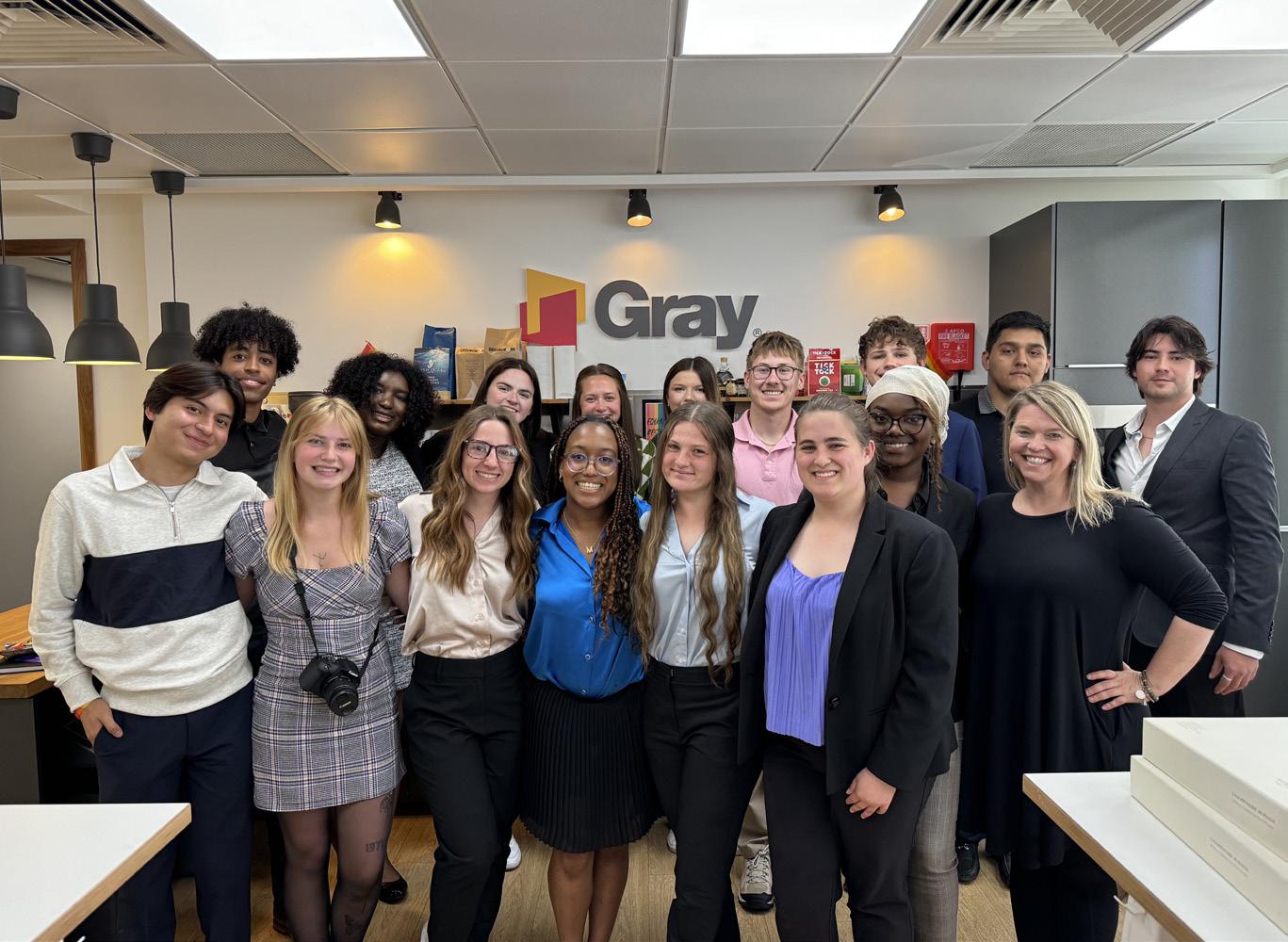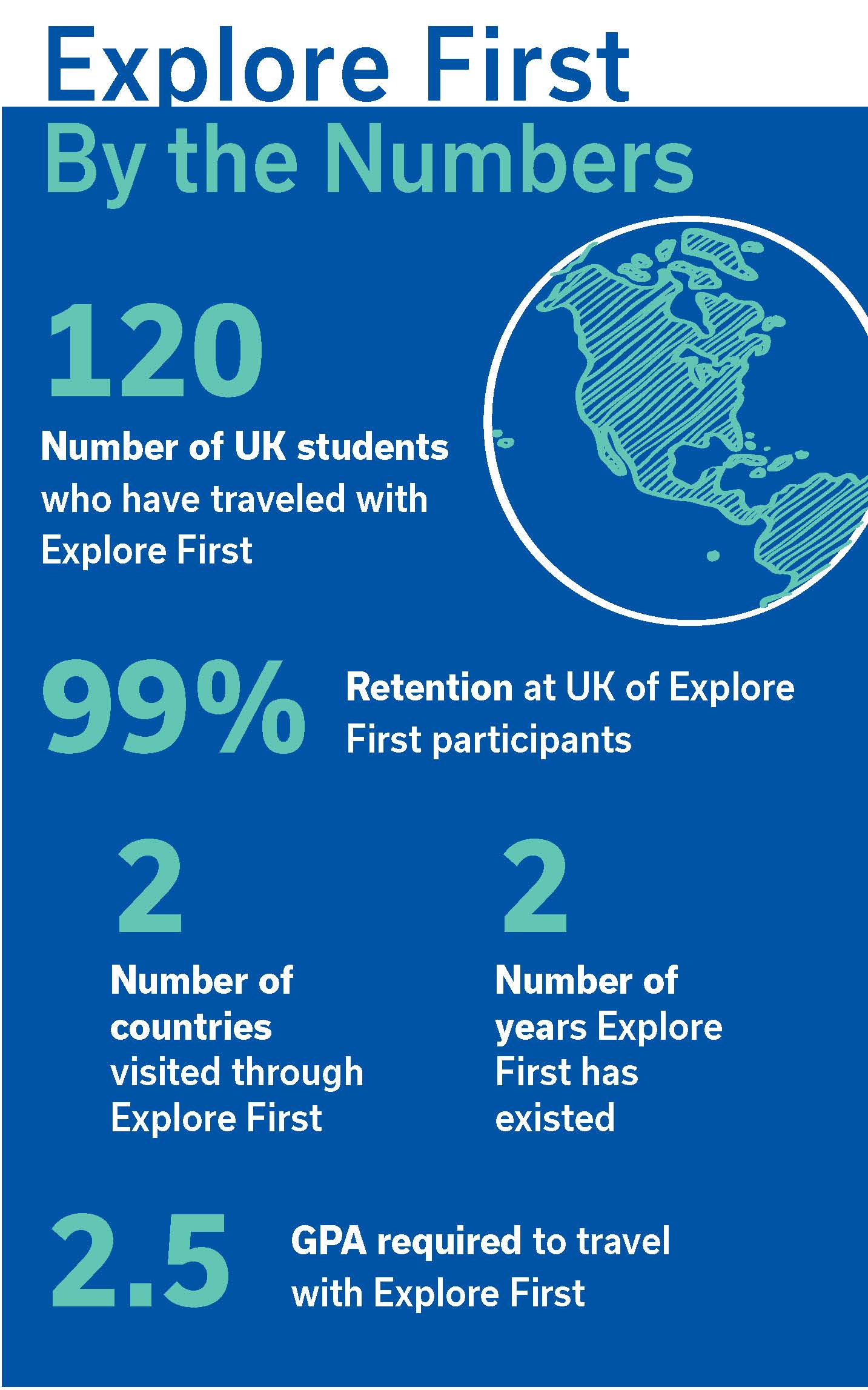
8 minute read
Global Wildcats: First generation students get first chance to study abroad
By Sarah Samiri
“There’s a first time for everything” is a saying that echoed in Laura Sustin’s head as she was getting ready to fly for the very first time. Sustin, who was a rising sophomore at the time, was going on her first trip abroad to London the summer of her freshman year.
Sustin, who’s now a junior and is from Louisville, Kentucky, majoring in psychology, recalls a wave of nervousness and excitement wash over her on her flight to London, England.
“I was like, oh, this is a little small … can this plane, you know, is this still able to fly good? But I had the window seat, and I just remember, oh my gosh, I need to get a picture of the outside of the plane. I was just amazed. I’m like how is this happening?”
Sustin, like many first-generation students, is no stranger to venturing into the unknown and taking on these first-time experiences. They are the first in their family to attend college to pursue a four-year degree, navigating the college application process, leaving home and living on their own.
For a lot of first-gen students, the idea of studying abroad can be intimidating. Going to a foreign country, even flying for the first time and going on a trip with new people, can be overwhelming. In addition, finding a way to pay for study abroad trips can add to that stress.

Launched in the summer of 2023, Explore First: Careers, Cultures and Connections is an education abroad program designed specifically for first-gen students who are demonstrating academic ability, who have financial need and who have never traveled outside the U.S. or in just a limited way.
Sue Roberts, associate provost for internationalization says, “It’s a study abroad program designed specifically for those students who don’t think they’re going to be able to do study abroad and don’t imagine that it’s for them.”
The program is open to all majors and combines career readiness within a global context to put students, their skills and educational experience at the forefront.
Roberts describes Explore First as a soft and easy first study abroad trip. Students meet at the airport and fly as a group. Once they get to their destination, they are picked up by a bus to take them where they will be staying, and they are assigned roommates.
Kauner Shacklette, a junior from Elizabethtown, Kentucky, majoring in architecture with a certificate in historic preservation went to Dublin, Ireland, this past summer.
He describes traveling in a group as a great bonding experience.
“Traveling in a group was reassuring because we could share observations and experiences together and I never felt like I was truly alone while I was there. It also made it easier to step out of my comfort zone knowing I wasn’t alone in figuring things out.”

In total, 60 students are selected to go on the Explore First trip each year. There are four groups of 15 students each, two groups go to London, the other two go to Dublin, Ireland. The three-week education abroad program allows students to earn three University of Kentucky credit hours through the completed coursework and career preparation.
Alongside the students, two UK staff members go on each trip. Generally,
• One is a first-generation program advisor who works with first-gen students every day, understands their needs, assets, determination, and their educational ability.
• One is from the UK Stuckert Career Center who equips students with resources and tips to prepare for job opportunities.
Collaborating with corporate partners, the program connects students with businesses that have a global presence. Businesses including GreyStar, LinkedIn, Microsoft, Alltech, Gray Construction, etc., hold on-site visits for students, speed networking, panel discussions, and resume workshops.

“We source companies that have ties to Kentucky. They are either Kentucky-based companies or global companies that are active in Kentucky,” said Roberts, explaining how companies are selected. "The organizations that host the UK students usually organize some kind of event, such as a panel with early career employees who were themselves first generation college students and are now building their careers."
One such example took place in the summer of 2024 when Explore First students visited Abbie Roden, a graduate of the Gatton College of Business and Economics. Roden talked with students about her business experience and success. Jayela Davis, a senior from Louisville, Kentucky, studying human health sciences, traveled to Dublin, Ireland. She said the leadership sessions and speed networking events have improved her ability to connect with others who have cultural and career backgrounds unlike hers.
“I find that making a significant connection in the beginning and getting to know someone with an open mind is a skill. I use it until this day, and I love making interpersonal connections with people in different career fields and with different interests because one day I may be in that field and we have some sort of knowledge from that connection I’ve made.”
For Shacklette, the opportunity opened his eyes to the possibility of working abroad one day.
“I think one of the standout moments from the trip, was getting to talk to professionals from Gray which was actually a business that originated in Kentucky and so seeing how they are expanding their business throughout other countries around the world and talk to people who had moved from the U.S. to Ireland for their jobs and how they’re living now. I think that was really cool.”

Kayla Gill, UK associate director of first-generation initiatives, saw the impact and growth from the trips abroad firsthand.
Gill says that she saw a shift in students — a heightened confidence — after three weeks abroad. Through the class work and professional development workshops, students learned professional skills like building a resume and practicing elevator pitches. Gill noticed that by the end of the trip, students were comfortable in a business environment, speaking to employers and presenting themselves in networking events and panels.
In addition to professional development, Explore First gives first-gen students an opportunity to explore a different part of the world, learn about other cultures, connect with locals and step outside of their bubble.
Sustin made memories in London that will stick with her, she said. She remembers a man in London who overheard Sustin and her roommate trying to make plans for the rest of the trip in London. He offered them a list of activities and sites to see.

“He was so warm and welcoming; he told us a little about his background and he wrote down a list in his journal and wrote down a list of things that we should do in London. I have that list till this day, I hold it in my memory box.”
Since its beginning in 2022, Explore First has received funding from public and private sources.
Roberts observed that the funding Explore First has received has been put into scholarships that have made studying abroad more accessible for first generation students with financial need. Explore First students pay a $500 fee, pay to get a passport if needed and they have to bring spending money for food and outings while they are on their trip.

Since its beginning, Explore First has given 120 first-gen students an opportunity to study abroad, including Sustin. She explained in her application that study abroad felt out of reach for her before learning about Explore First.
“I wrote about the fact that I had never flown before, my family being from a whole different side of the world, experiences like this don’t just come in your hands, opportunities like this don’t come out of thin air. It would be an honor to do something like this.” ■








